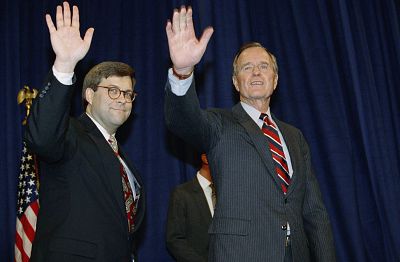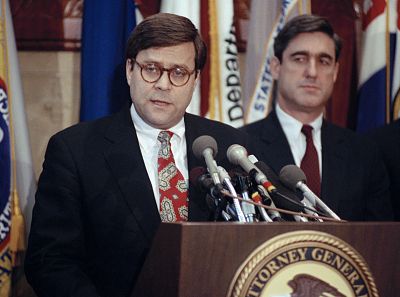The attorney general has long held a broad view of the powers of the presidency — and a dim view of special counsel investigations.
The man who made public special counsel Robert Mueller's report on Thursday is a longtime opponent of special counsel investigations.
 ADVERTISEMENT
ADVERTISEMENT
 ADVERTISEMENT
ADVERTISEMENT
President Donald Trump nominated William Barr, 68, who is a close friend of Mueller, to be his attorney general months after Barr had sent an unsolicited 19-page memo to the president's lawyers arguing that the investigation into whether Trump obstructed justice in the Russia probe was "overly aggressive" and "fatally misconceived."
"The Constitution vests all Federal law enforcement power, and hence prosecutorial discretion, in the President. The President's discretion in these areas has long been considered 'absolute,'" Barr wrote. Constitutionally, he added, there is no legal prohibition against the president "acting on a matter in which he has a personal stake."
Democrats questioned whether that June 2018 memo — which was also sent to Mueller's supervisor, Deputy Attorney General Rod Rosenstein — was a de facto job application, a charge that Barr called "ludicrous" at his confirmation hearing this year.
The Democrats remain unconvinced. Since Barr was confirmed as attorney general on Valentine's Day, he has issued a bare-bones summary of the Mueller report's findings, and has determined that Trump should not be prosecuted on obstruction of justice charges.
He also appears to have embraced Trump's theories about the Russia investigation, telling a Senate subcommittee last week that "spying did occur" against the president's campaign. "He's the attorney general of the United States of America, not of Donald Trump," House Speaker Nancy Pelosi responded.
His fellow Republicans say Barr is a man of "the highest integrity" who's just following his views of the law.
Barr's friends told NBC News he sent the memo out of a deep sense of duty — the same reason he accepted Trump's offer to be attorney general, a job he'd held from 1991 to 1993 when George H.W. Bush was president.
"I was very surprised he decided to" accept Trump's offer, Richard Cullen, a lawyer and a longtime friend, said. "He really felt like there was a unique need for him to go back into the department."
"Bill didn't need this job for any reason whatsoever," said J. Michael Luttig, a former federal judge who worked with Barr at the Department of Justice in the 1990s and remains close with him. "He took it out of concern for the law and the rule of law in the country."
Barr maintains he's his own man, testifying at his confirmation hearing, "I will not be bullied into doing anything I think is wrong by anybody, whether it be editorial boards or Congress or the president."
But the New York City native has always had an expansive view of the powers of the presidency. In his first go-around as attorney general, he advised Bush that he didn't need Congress' approval to begin a military campaign in Iraq.
"He has a long, captivating interest in the office of the presidency," Luttig said.
Whilein kindergarten, Barr reportedly gave a speech praising President Dwight D. Eisenhower, and pledged his support for Richard Nixon while attending a Roman Catholic elementary school in Manhattan.
"The most radical period I had probably was when I was sort of a moderate Republican," he once joked to a friend, according to The Washington Post.
Barr attended Columbia University, where his father had been dean of the engineering school, and joined the CIA after getting a master's degree in Chinese studies. He became a congressional liaison at the agency, and helped the senior Bush, then-CIA director, with testimony on Capitol Hill.
He earned his law degree from George Washington University while working at the CIA, and went into private practice after Democrat Jimmy Carter was elected president. He worked on domestic policy for the administration of President Ronald Reagan in the early 1980s, and then went to work in the Justice Department after Bush won the White House.
As the head of the agency's Office of Legal Counsel, Barr gave legal justification for the administration to invade Panama and arrest dictator Manuel Noriega, and wrote a legal opinion that said the United States has the power to arrest terrorists overseas without a foreign government's permission.
"He tried to run the office as a world-class, best-in-class law firm for the executive branch," said Luttig, who's now general counsel for the Boeing Company.
Barr's work at the OLC led him to be named deputy attorney general, and he was acting attorney general in August 1991, when a group of more than 120 Cuban detainees took 10 people hostage in a federal prison in Talladega, Alabama. Barr gave the green light to the FBI to launch a daring rescue operation, and all the hostages were rescued unharmed.
As for the hostage-takers, Barr said in a 2001 oral history of the Bush administration that he had them put on a plane to Cuba "before the civil rights lawyers and all these people could come with injunctions and stuff."
Bush nominated Barr for the permanent job soon after, and he breezed through the confirmation process.
As attorney general, Barr continued to promote his broad view of presidential powers.
"I believed that the president did not require any authorization from Congress, and I believed that the president had constitutional authority to launch an attack against the Iraqis," he said in the oral history, referring to the Iraq War. "But I also knew that it didn't much matter what I thought, because that's what he was going to do. He believed he had the authority to do it, and that's ultimately more important than what I believe."
He also encouraged Bush to pardon Reagan administration members who'd been the subjects of independent counsel Lawrence Walsh's probe in the Iran-Contra scandal, a highly controversial move.
Much like his current boss, Barr took a hard line on immigration issues — blocking Haitians with HIV/AIDS from coming to the U.S., and sending thousands of Haitians seeking asylum in the U.S. to the American military base in Guantánamo Bay, Cuba. A federal judge later found that practice "an abuse of discretion" and ordered those remaining on the base to be allowed into the U.S.
On the southern border, Barr pushed for beefed-up security and fencing. "Good effective fences did cut down substantially on immigration. It was a big issue out in California, so I devoted a lot of effort and energy to doing our best to shut down the border in California," he said in the oral history.
He also signed off on a program called USTO, which allowed the Drug Enforcement Administration to secretly gather records on Americans' international phone calls. The agency would go on to get information about billions of phone calls under the program, which was also approved by the then-head of the Justice Department's criminal division — Mueller.
"They were good friends of one mind about how the department should be run," Cullen, a former U.S. attorney, said of the relationship between Barr and Mueller.
Luttig said Barr was also friends at the time with Ken Starr, who was Bush's solicitor general and would go on to lead the special counsel investigation into Bush's successor, President Bill Clinton. Barr thought that probe — like the earlier Iran-Contra investigation — was "destructive," Luttig said.
Barr returned to private practice after Bush lost the 1992 election, and became general counsel for telecommunications giant GTE Corporation, which merged with Bell Atlantic to become Verizon in 2000. But the Justice Department was never far from his mind.
He stayed in touch with former co-workers and "would have Christmas parties at his home with just the DOJ guys," including Mueller, Cullen said, adding, "It was a reunion everybody looked forward to every year."
Barr resigned from Verizon and joined the law firm of Kirkland & Ellis in 2009, while also keeping up with one of his favorite pastimes — bagpiping.
He started playing the instrument when he was eight, and was involved in international competitions into the 1990s. In 2017, he became a board member of the U.S. Piping Foundation, a group that supports competitions for bagpipers, the Daily Beast reported.
While he supported his former boss' son, Jeb Bush, in the 2016 Republican primary — Barr donated $55,000 to a political action committee supporting his campaign — he later gave $2,700 to team Trump and publicly defended him after he took office. That included telling The New York Times he thought there was more of a reason to investigate the Clinton Foundation than there was to probe allegations of collusion between Russia and the Trump campaign.
Barr married Christine, a librarian, in 1973, and they live outside of Washington in McLean, Virginia. Christine Barr is good friends with Mueller's wife, Ann, and they go to Bible study together, friends said. The Muellers attended the weddings of two of the Barrs' daughters.
Mary Daly, one of the Barrs' three adult daughters, had already been working for the administration — she was running the Justice Department's efforts against opioid addiction. She moved to a job at the Department of the Treasury after her father was nominated to be her boss, CNN reported.
The other two daughters are lawyers as well.
Barr said he told Trump about his relationship with Mueller when he first asked him to join his legal team in 2017.
"I told him how well I knew Bob Mueller and that the Barrs and Muellers were good friends and would be good friends when this was all over," Barr said.












